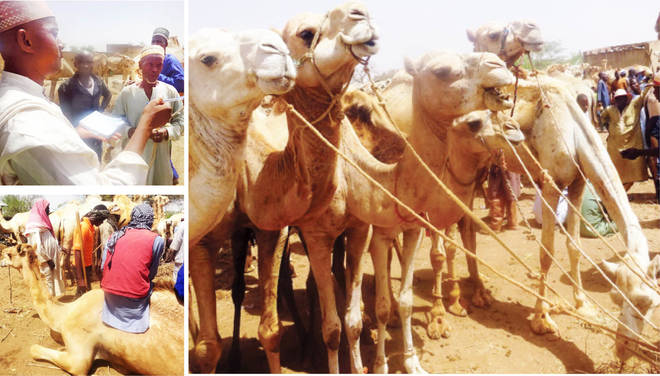Ilela: Inside the camel trade
A caravan of 40 camels arrives at the gate that offers ingress into the Ilela international market, Sokoto. It has been a 10 days’ camel- journey from Niger Republic’s town of Abala, one of the leading camel hubs from where the renowned border market in Sokoto receives its supply of camels. Sokoto boasts of a […]


A caravan of 40 camels arrives at the gate that offers ingress into the Ilela international market, Sokoto. It has been a 10 days’ camel- journey from Niger Republic’s town of Abala, one of the leading camel hubs from where the renowned border market in Sokoto receives its supply of camels.
Sokoto boasts of a large camel market at its commercial town of Ilela, which shares a border with Niger Republic to the north.
Livestock dealers from the two countries engage in a robust cross border business with camels as a key trade item.
Notwithstanding the prevailing age of technology which presents varieties of automated devices for different purposes, camels, otherwise referred to as the ‘ship of the desert’, remains indispensable in the day-to-day activities of many. Today, the camel, a foremost beast of burden, is still among the widely sought after domestic animals for farming and transportation. Its meat and milk are also consumed by some people.
Despite the economic downturn, camel business is still going on in full force in some local government areas of Sokoto, that is, Ilela, Bodinga, and Tambuwal.
At the Ilela market, the biggest of the three, the camel section of the livestock souk is always a beehive of activities, and filled to the brim every Sunday, which is the market day.
Transactions go on amidst densely populated camel spaces, whose owners stand close by waiting for potential buyers.
The camels stand in groups close to one another, some drinking from water pots, others munching from the Harawa (dried bean leaves and stems) feed, and at close intervals making loud roaring noises.
A strong stench from their fresh dung rent the air ,but this did not in any way disturb the hustle and bustle of the business.
Chairman Camel Sellers Association, Ilela border market, 55-year-old Alhaji Jadi Mohammed who has spent 30 years in the business, reveals that the camels are brought to the market for sale from Abala and some other towns in Niger Republic, as well as some parts of Sokoto such as Dundaye in Wamakko local government area, Dodoru in Tambuwal, Ruwawuri in Tangaza and Lakoda in Ilella.
The price of a camel at Ilela market depends on the size. Those available as at the time of the visit by Daily Trust were said to range from N150,000-N300,000.
Every week, people come from within and outside Sokoto state to purchase the animal.
Mohammed notes that buyers regularly come from Niger, Kebbi, Lagos, Abuja and Kaduna states.
“Those who come from within Sokoto mostly take the camels to their destination on foot, while the ones going to other states, transport them in large trucks,” he observes.
Mohammed’s face glowed with joy while crowing about the market. “The Ilela International market has never experienced shortage of camels,” he asserts.
On the association, he explains: “It has over 100 members comprising owners of camels, middlemen and elders who have been in the trade for long .A single merchant can bring in 30-40 camels at a time.”
The major challenge, the chairman bemoans, is lack of space to accommodate the camels at the market.
“Cows that pass through the camel section of the livestock market are also causing a lot of hazard. Some of the stray wild cows do injure our camels with their sharp horns. Sometimes the injury is so much that an affected camel would almost die, and we have to sell it to butchers,” he laments
He therefore appeals to government to hasten their relocation to the proposed site that is more favourable and conducive for the conduct of the camel business. “Almost all arrangements had been concluded concerning relocating the camel market to a suitable place by the local government and ministry of Lands and Housing, Sokoto.”
The other challenge, according to him, is that of the economic downturn which he observes, has led to reduction in the number of customers, resulting in glut in the business.
Sarkin Rakumma (King of camels) Muhammadu Dikko supervises the buying and selling of camels at Ilela market and ensures sanitized transactions.
This, he does by close scrutiny of the camels sold to purchasers, before he offers a receipt to the buyer.
“I have spent 40 years doing this, and sometimes buyers who skip our rules only end up with security personnel confiscating the camel,” he divulges.
Sarkin Rakumma re-echoes calls for prompt relocation of the camel market to the proposed site ,which he notes, has been officially secured.
In an encounter with Daily Trust, 40-year-old Abubakar Mariga from Niger state relates his experience as a first time visitor to Ilela camel market.
“I came to buy camels here to use for farming at home in Niger State. A friend told me about the market and accompanied me here,” he discloses.
Mariga who bought a medium size camel at N180,000, expresses satisfaction with the outcome of the transaction.
After collecting his receipt from the Sarkin Rakumma, Mariga holding his camel by the long rope tied to its mouth, made his way out of the market.
